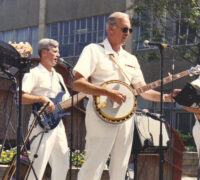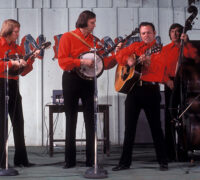
On this day …..
On January 22, 1938, Bill Emerson was born in Washington D.C., from where he went on to be one of the most important banjo players in bluegrass music history.
William Hundley “Bill” Emerson, Jr. was influenced towards becoming a musician by his listening to country and bluegrass music records. He began by playing the guitar, but when introduced to bluegrass music he was captivated by the sound of the banjo.
As a 15-year-old, he traded his electric guitar and purchased an inexpensive Belltone banjo; he credits John Duffey with showing him some basic rolls and chords. Afterwards, a local banjo player, Smitty Irvin, who later played banjo with Bill Harrell, helped him the most. Although impressed by Earl Scruggs, Don Reno and Ralph Stanley, it was Don Stover – on television – and Bill Blackburn – at his personal appearances – providing opportunities for Emerson to learn further.
After playing the banjo for just three months Emerson won first prize playing Lonesome Pine Breakdown at a competition at Luke Gordon’s Solver Creek Ranch (near Paris, Virginia).
His first professional job was with Uncle Bob & the Blue Ridge Partners, who Emerson heard on WINX, Rockville, Maryland. Emerson went to the radio station and impressed Uncle Bob sufficiently that he was asked to join his band.
Subsequently, he had a stint with Roy and Curly Irvin, playing in small clubs like the Pine Tavern in Washington D.C..
That arrangement didn’t last long as in a few months Emerson moved to play with Buzz Busby and the Bayou Boys. While with Busby, Emerson recorded Lost, Lonesome Wind, Me and The Jukebox, and Going Home, among other songs.
Shortly afterwards Busby was involved in an automobile accident, though, fortunately for Emerson, he was not in the vehicle at the time.
At the time, Busby had a regular booking at the Admiral Grill in Bailey’s Crossroads, northern Virginia. So, to keep the date, Emerson and a fellow Bayou Boy, Charlie Waller, put together a band; which by July 1957 became the ground-breaking Country Gentlemen.
At about this same time Emerson first played banjo with Bill Monroe’s Blue Grass Boys; that occasion being at New River Ranch, Rising Sun in Maryland. He went on to play with Monroe “from time to time,” to quote Emerson in an interview with Joe Ross (for Bluegrass Unlimited magazine). One other occasion was in March 1971 at the Bluegrass Jamboree at the Virginia Theatre, Alexandria, Virginia, one of the first of such indoor events.
Emerson recorded a few singles with the Country Gentlemen; one for the Dixie label, Going to The Races b/w Heavenward Bound (released in 1957); and two for Starday, Dixie (Look Away) b/w Backwoods Blues, and High Lonesome / Hey, Little Girl. Backwoods Blues was paired with It’s the Blues for another single.
However, this spell with the Country Gentlemen didn’t last long, as by the fall of 1958 he had left the band and started playing with the Stoneman family. This set the tone for a chequered period during the following decade.
By 1960 he was playing with Bill Harrell; then early in 1961 he joined Jimmy Martin and the Sunny Mountain Boys with whom he gained recognition as a touring musician, and played on the first of a series of recordings for Decca Records: for the LP This World Is Not My Home, released in 1963; in the same year two songs – Please Keep Remembering and Love’s Chance Again – that Emerson recorded with the Yates brothers (Wayne and Bill) were released as a Kash single; during the following year he joined Red Allen & the Kentuckians, with whom Emerson recorded 12 tracks for the LP The Solid Bluegrass Sound Of The Kentuckians (released on the Melodion label); before moving on to re-join Jimmy Martin, recording tracks for the LPs Mr Good and Country (1966) and Big & Country Instrumentals (1967).
Early in 1967 he cut a selection of fiddle and banjo duets with Scotty Stoneman (Fiddle and Banjo Blue Grass) released on the obscure Arion label.
In 1968 Emerson joined forces with guitarist Cliff Waldron using the stage name Emerson & Waldron and the Lee Highway Boys (later New Shades of Grass). They recorded three albums for Rebel Records; New Shades of Grass (SLP-1485, released in 1968), Bluegrass Country (SLP-1489, 1969) and Emerson and Waldron Invite You to Bluegrass Session (SLP-1493, August 1970). Perhaps the most-enduring highlight of the partnership with Cliff Waldron was their recording of Fox on The Run, the Manfred Mann pop song that he heard on his car radio and that he re-arranged for the duo. Their recording of the song – on the LP Bluegrass Country – made it an essential part of the bluegrass music canon for many years.
During the very early part of that decade Emerson, with a random group of other musicians dubbed the Virginia Mountaineers – Buzz Busby, Red Allen, Bill Harrell Frank Wakefield and Tom Morgan – recorded about 25 instrumentals that were released on a few budget LPs.
Some 12 years after leaving them Emerson re-joined the Country Gentlemen, replacing Eddie Adcock. During this period with the band Emerson worked the recordings for the LPs Sound Off (Rebel, released in 1971) and The Country Gentlemen (Vanguard, 1973).
However, that link-up with the Country Gentlemen was abruptly terminated as in February 1972 in a frightful incident outside the Red Fox Inn in Bethesda, Maryland, Emerson was the victim of a drive-by shooting, suffering a wound to his right forearm.
When he had recovered fully he joined the U.S. Navy Band the next year, assuming the rank of Master Chief Petty Officer. While a member of the forces he formed the country/bluegrass band, Country Current. Serving his time based in Washington DC, he played for and travelled with Presidents Carter, Reagan and Bush, and many other dignitaries world-wide while making numerous TV and radio appearances.
For 50% of the time Emerson actually played a guitar as Country Current performed an assortment of music. He continued to serve in the Navy until retirement in 1993.
During those 20 years in uniform, Emerson played on several albums as a guest; Shenandoah Grass – Yesterday and Today with Jim Eanes; Stained Glass Bluegrass with the Busby Brothers; Every Time I Sing a Love Song with Larry Stephenson; and Classic J.A.G. with Jimmy Gaudreau. Also, he collaborated with songwriter Pete Goble, the duo recording two LPs for Webco; Tennessee 1949 – a # 1 album – and Dixie In My Eye.
All of those albums were released on the Webco Records label, founded by Wayne E. Busbice. Between 1985 and 1988 Emerson worked with Busbice as A&R director. Then in 1989 Emerson, with his son John, took over the label. From 1990 until 1994 his son John operated the label as Webco Records of Virginia, moving it into the major league with the more widely distributed Sugar Hill, Rounder and Rebel Records. In 1994 Pinecastle Records’ owner Tom Riggs acquired the Webco label.
In 1992 Emerson’s Reunion album was released; it featured some of the lead singers with whom he had worked up to that period in his career, namely Jimmy Martin, Charlie Waller, Red Allen, Wayne Taylor – a Country Current protégé of Emerson’s – and Tony Rice. The CD was nominated for the IBMA’s Album of the Year award.
During the same period Emerson recorded two solo albums for Rebel Records; Home of the Red Fox (released in April 1988) and Gold-Plated Banjo (September 1990).
For most of the remainder of 1990s Emerson enjoyed the fruits of his earlier labors, although he did further recordings with Wayne Taylor, Appaloosa (Webco, released in July 1994); and a collaboration with Mark Newton; A Foot in The Past, A Foot in The Future (Pinecastle, from February 1998). Also, he sang baritone on the CD Tony Rice Plays and Sings Bluegrass just a few of the recordings that he did with Rice in the 1990s.
In February 1996 a further CD was all-instrumental Banjo Man (Webco/Pinecastle) featuring some tracks recorded in previous Webco sessions.
In 2007, after encouragement from Tony Trischka, Emerson came out of retirement, just as he was approaching his 70th birthday, to form his own band, Sweet Dixie, adding to his already superb catalogue of recordings with a CD for Rebel Records; Bill Emerson & The Sweet Dixie Band (released in October 2007) with three further albums released by Rural Rhythm; Southern (January 2010), Eclipse (April 2011) and The Touch of Time (January 2012) released in consecutive years.
These were followed by Dancin’ Annie (Rural Rhythm, 2014) and The Gospel Side of Bill Emerson & Sweet Dixie (another Rural Rhythm album, released in September 2015). The single Dancing Annie is currently # 2 on Roots Music Report Traditional Bluegrass Top 50 singles. Indeed, all of the Bill Emerson & Sweet Dixie recordings have charted very well.
He continues to be active, having been in a recording studio recently working on an album that he hopes to release later this year.
Throughout his career Bill Emerson has been recognised for his many contributions to the bluegrass music field. He is considered of the genre’s most influential five-string banjo players. Also, Emerson is noted for being an excellent, strong baritone singer.
That said, some feel it more than a bit remiss that he hasn’t yet become a member of the International Bluegrass Music Hall of Fame, an honor for which he was first nominated in 2009.
Some accolades that Emerson has received include –
- 1959 – National champion banjo player awarded at the National Championship Country Music Contest in Warrenton, Virginia.
- 1972 and 1973 – Awarded Banjo Player of the Year at the 2nd and 3rd Annual Muleskinner News Awards, Camp springs North Carolina.
- 1990 – the Stelling Banjo Company issued an Emerson signature banjo model – the Bill Emerson Red Fox Model.
- 2000 – Inducted into the SPBGMA Preservation Hall of Greats in Nashville Tennessee.
- 2006 – Inducted into the Washington Area Music Association (Wammies) Hall of Fame.
- 2007 – Winner IBMA Recorded Event of the Year – Double Banjo Bluegrass Spectacular.
- 2008 – Honorary Life Member of the IBMM Museum and included in IBMM’s Pioneers of Bluegrass
- 2009 – Inducted into the Southern Legends Entertainment and Performing Arts Hall of Fame.
- 2010 – received the Washington Monument Award (presented at the inaugural DC Bluegrass Festival on March 27, 2010).
- 2011 – Certificate of Recognition presented Virginia Governor McDonnell.
- 2016 – received the IBMA’s Distinguished Achievement Award
Emerson has played on two Grammy nominated projects; Tony Rice Plays and Sings Bluegrass (in 1994) and Tony Trischka’s Double Banjo Spectacular (2007).
Additionally, he has had many nominations for awards presented by the IBMA.
Tom Gray, another stalwart of the Washington D.C. area bluegrass music community, sends his greetings …..
“Thank you for enriching this music that we love. And thanks for teaching me a difficult lesson. And HAPPY BIRTHDAY!”
Larry Stephenson shared these thoughts …..
“If it were not for Bill Emerson, I may not have started my band in 1989. We were working together on the Emerson & Goble recording and he was so encouraging and his kind words about my abilities helped me to step out with my band. He also played banjo with me on the first date my band played. I love Bill Emerson and his wisdom and his encouragement to young guys like me.
Bill Emerson needs to be in the IBMA Hall of Fame!
Happy Birthday, Bill.”
Bluegrass Today is pleased to recognise one of the all-time bluegrass legends on his 80th birthday …
Happy Birthday Bill Emerson!









